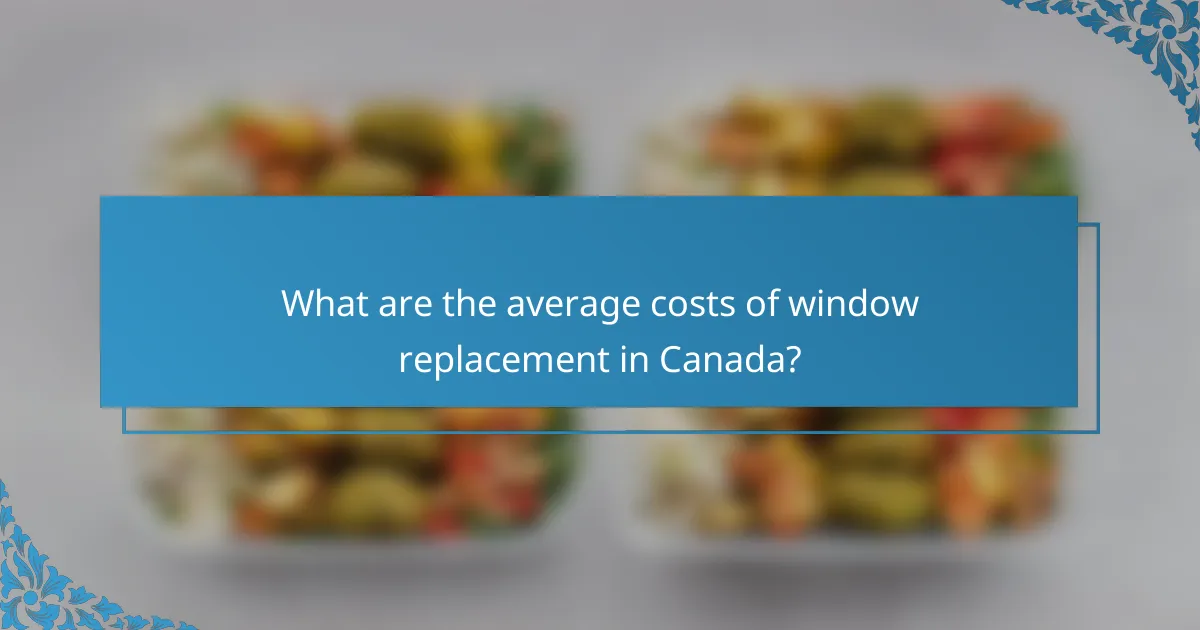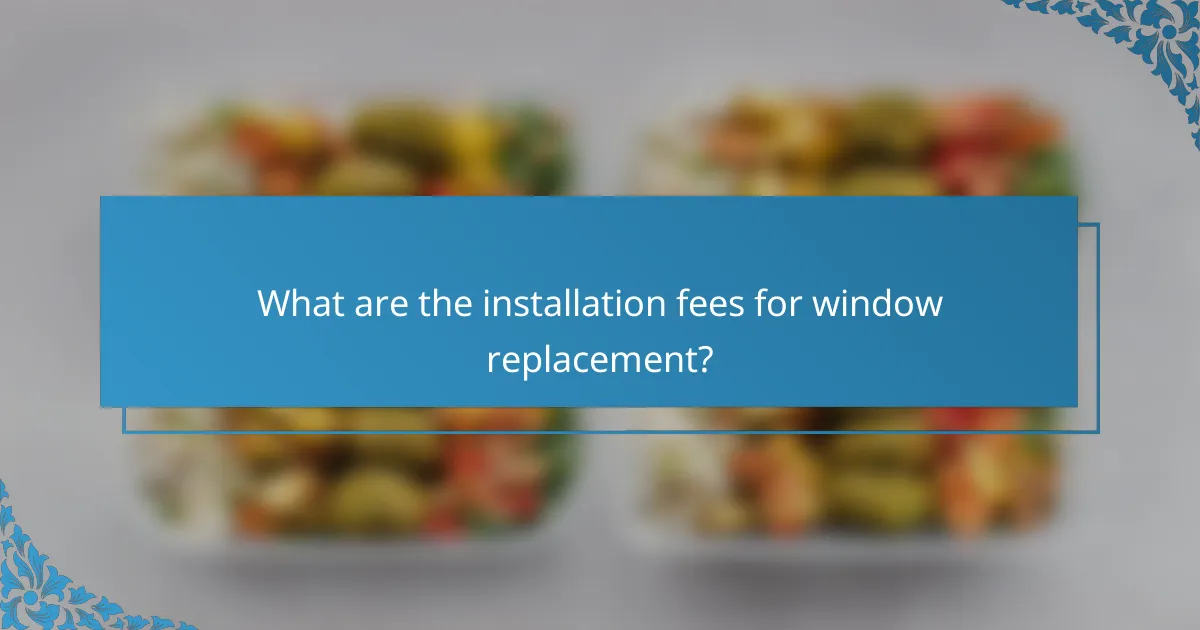Replacing windows can be a significant investment for homeowners, with average costs in Canada ranging from CAD 300 to CAD 1,000 per window, influenced by factors like window type and installation complexity. In addition to the initial expense, installation fees can vary widely, often adding several hundred to over a thousand dollars per window. However, the benefits of new windows extend beyond aesthetics, as they greatly enhance energy efficiency, leading to reduced energy bills and improved comfort year-round.

What are the average costs of window replacement in Canada?
The average costs of window replacement in Canada typically range from CAD 300 to CAD 1,000 per window, depending on various factors such as window type and installation complexity. Homeowners should budget for both the windows and installation fees to get a complete picture of the total expense.
Cost range for standard windows
Standard windows, which include double-hung and casement styles, generally cost between CAD 300 and CAD 800 each. This price range can vary based on the material, size, and energy efficiency ratings of the windows. For example, larger windows or those with enhanced insulation may push costs toward the higher end of this spectrum.
Installation fees can add another CAD 100 to CAD 300 per window, depending on the contractor and the complexity of the installation. It’s advisable to obtain multiple quotes to ensure competitive pricing.
Factors influencing window replacement costs
Labor costs also play a crucial role. Regions with a higher cost of living may see increased installation fees. Furthermore, if the existing window frame requires repairs or modifications, this can add to the overall expense.
Comparison of vinyl vs. wood windows
Vinyl windows are often the more affordable option, typically costing between CAD 300 and CAD 600 per unit. They are low-maintenance, energy-efficient, and resistant to moisture, making them a popular choice among homeowners.
Wood windows, while aesthetically pleasing and offering excellent insulation, usually range from CAD 600 to CAD 1,200. They require regular maintenance to prevent rot and damage but can enhance the overall look of a home. Ultimately, the choice between vinyl and wood will depend on budget, maintenance preferences, and design goals.

What energy efficiency benefits do new windows provide?
New windows significantly enhance energy efficiency by reducing heat loss in winter and minimizing heat gain in summer. This leads to lower energy bills and a more comfortable indoor environment throughout the year.
Impact on heating and cooling costs
Replacing old windows can lead to substantial savings on heating and cooling costs. Homeowners often see reductions in energy bills ranging from 10% to 25% after installing energy-efficient windows, depending on their previous window condition and local climate.
For example, in colder regions, high-quality insulated windows can prevent drafts and heat loss, while in warmer areas, reflective coatings can reduce cooling demands. Investing in new windows can pay off in just a few years through these savings.
Energy Star ratings and certifications
Energy Star ratings indicate that windows meet strict energy efficiency guidelines set by the U.S. Environmental Protection Agency. Windows with this certification are designed to provide better insulation and reduce energy consumption.
When shopping for new windows, look for the Energy Star label, which can help identify products that will lower energy costs. Additionally, local utility companies may offer rebates for installing Energy Star-certified windows, further enhancing the financial benefits of your investment.

What are the installation fees for window replacement?
The installation fees for window replacement can vary significantly based on location, window type, and labor costs. Generally, homeowners can expect to pay anywhere from a few hundred to over a thousand dollars per window for installation, depending on these factors.
Typical labor costs in Canada
In Canada, labor costs for window installation typically range from CAD 50 to CAD 100 per hour. The total labor expense may depend on the complexity of the installation and the number of windows being replaced. For a standard installation, homeowners might pay between CAD 300 and CAD 800 for labor alone.
Factors affecting installation fees
Several factors can influence the installation fees for window replacement. The type of window chosen, such as double-hung, casement, or sliding, can affect both material and labor costs. Additionally, the condition of the existing frame and any required modifications can lead to higher fees.
Other considerations include the geographical location, as labor rates can vary between urban and rural areas. Seasonal demand may also impact pricing, with higher costs during peak renovation months. Always obtain multiple quotes to ensure competitive pricing and quality service.

How to choose the right windows for your home?
Choosing the right windows for your home involves considering factors such as style, material, energy efficiency, and local climate. Assess your needs and preferences to find windows that enhance both functionality and aesthetics.
Window styles and materials
Window styles vary widely, including double-hung, casement, and sliding windows, each offering unique benefits. Materials such as vinyl, wood, and fiberglass also impact durability and maintenance requirements.
For example, vinyl windows are often more affordable and require less upkeep, while wood windows provide a classic look but may need more maintenance. Consider your budget and the desired appearance when selecting styles and materials.
Local climate considerations
Your local climate significantly influences the type of windows you should choose. In colder regions, energy-efficient windows with low U-values can help retain heat, while in warmer climates, windows with high solar heat gain coefficients can reduce cooling costs.
Additionally, consider local building codes and regulations that may dictate specific window requirements for energy efficiency. Researching local weather patterns can also guide your selection to ensure optimal performance throughout the year.

What permits are required for window replacement in Canada?
In Canada, window replacement typically requires a building permit, which ensures compliance with local building codes and safety regulations. The specific permits needed can vary by province and municipality, so it’s essential to check local requirements before starting your project.
Common permit requirements by province
Each province in Canada has its own regulations regarding window replacement permits. For example, in British Columbia, a building permit is generally required for any significant changes to windows, while in Ontario, permits may be necessary if the replacement affects the structure or energy efficiency of the home. It’s crucial to consult your local building authority for precise requirements.
In Quebec, homeowners often need a permit if the window replacement alters the exterior appearance of the building. Alberta typically requires permits for replacements that involve structural changes. Always verify with your local municipality to avoid fines or delays.
How to apply for permits
Applying for a window replacement permit usually involves submitting an application form along with detailed plans of the proposed work. You may need to provide information about the window specifications, including energy ratings and materials used. Some municipalities allow online submissions, while others may require in-person visits.
It’s advisable to gather all necessary documentation, such as proof of ownership and any previous permits, before starting the application process. Additionally, check if there are fees associated with the permit, as these can vary significantly across provinces and municipalities.

What are the best practices for window maintenance?
Regular window maintenance is essential for prolonging their lifespan and ensuring optimal performance. Key practices include routine cleaning, inspection for damage, and timely repairs to enhance energy efficiency and prevent costly replacements.
Cleaning and care tips
To maintain windows effectively, clean them regularly using a gentle solution of soap and water. Avoid abrasive cleaners that can scratch the glass or damage the frame. For exterior windows, consider using a squeegee to prevent streaks and ensure a clear view.
Additionally, inspect window seals and frames for dirt or debris that can affect their integrity. Keeping the tracks free of dust and grime will allow windows to open and close smoothly.
Signs of window damage to watch for
Look for signs of window damage such as cracks in the glass, gaps in the seals, or condensation between panes. These issues can indicate that your windows are no longer energy efficient and may need repair or replacement.
Other warning signs include difficulty opening or closing windows, drafts, and noticeable increases in energy bills. Regularly checking for these indicators can help you address problems early and avoid more extensive repairs later on.

What are the emerging trends in window technology?
Emerging trends in window technology focus on energy efficiency, smart features, and sustainable materials. Innovations such as triple glazing, low-emissivity coatings, and integrated smart sensors are becoming increasingly popular, enhancing both performance and convenience.
Energy-efficient windows
Energy-efficient windows are designed to minimize heat loss and improve insulation. Features like double or triple glazing, low-E coatings, and gas fills between panes significantly reduce energy consumption, leading to lower heating and cooling costs. Homeowners can expect energy savings of around 10-25% when upgrading to these windows.
When selecting energy-efficient windows, look for the ENERGY STAR label, which indicates compliance with energy performance standards. Additionally, consider the U-factor and Solar Heat Gain Coefficient (SHGC) ratings to ensure optimal performance for your climate.
Smart window technology
Smart window technology integrates sensors and automation to enhance comfort and efficiency. These windows can adjust their tint based on sunlight exposure, reducing glare and heat gain. Some models even allow remote control via smartphone apps, providing convenience and energy savings.
Investing in smart windows can be beneficial, especially in regions with extreme weather. However, consider the initial costs, as these windows may be pricier than traditional options. Weigh the long-term energy savings against the upfront investment to determine if it’s the right choice for your home.
Sustainable materials
Sustainable materials in window manufacturing focus on reducing environmental impact. Options like reclaimed wood, recycled aluminum, and fiberglass composites are gaining traction, appealing to eco-conscious homeowners. These materials not only offer durability but also contribute to a smaller carbon footprint.
When choosing sustainable windows, verify certifications such as the Forest Stewardship Council (FSC) for wood products. This ensures that materials are sourced responsibly, supporting environmental sustainability while enhancing the aesthetic appeal of your home.
